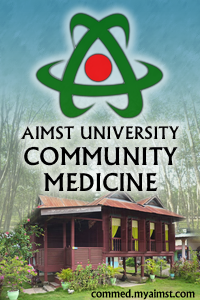We gathered at KK Merbok at 9am and had a sh0rt briefing by Pegawai Zat Makanan (PZM) Nutritionist, Mr. Wan Nurrusabah. There are 2 officers in charge of this unit for this district, so Mr. Wan has to travel to various clinics on different days to counsel patients regarding food nutrition.
His patients are generally antenatal mothers who are anemic and requires Iron supplements, children who are underweight, obesity problems, Thyroid disorders, and adolescents problems like hypertension, Diabetes Mellitus, obesity. His job is mainly to counsel them on healthy eating habits apart from the medications they may be taking.
In the community, programmes like health talks on weight management, balanced diet, healthy eating habits for senior citizens, children, adolescents and Diabetics are also carried out. Next programmes like Rancangan Bakul Makanan (Food baskets programme), Penyusuan susu ibu (breast feeding programme) and Iodine deficiency disorders are those that are commonly done in this district, mainly by Mr. Wan himself.
When we talk about malnutrition in children, we have to probe the questions to the parents in a few aspects. E.g. who is taking care of that child? when did they start to wean? What’s the pattern of weaning? e.g. after 6 months of age, are they only given a little bit of semi solids but milk of a bigger portion or they do not take semi solids at all but only drinks milk, when the child’s energy requirement increases due to more physical activities? All this must be looked into, however Mr. Wan told us this condition is commonly due to poverty.
The food basket programme that was mentioned earlier, is created for those with per capita income of RM 112-115 and weight that falls into the yellow/red centile. (Refer to the follow up card of a child, the blue and red cards in KKIA) and for those of 6 months to 6 years of age.
The food basket contains food of all classes, i.e. rice, beehoon (Carbohydrates), ikan bilis, Sardines and Eggs (Protein), cooking oil, margerine (Fats), full cream milk 1kg per month, multivitamins. Only dry food are given and given according to the age of the child, but an extra 50% of the normal calories requirement for the child are given. This basket is estimated to be about RM 150.
Their weight and height will be assessed by the MO every 4 months and sometimes the nurses will travel to some houses for demonstration of cooking. They will be given this food basket until their weight returns to normal (the white centile in the growth chart) or when they start going to school at 7 years of age, and if they are still underweight at that time, they are eligible for RMT (Rancangan Makanan Tambahan).
There are currently 13 malnutrition cases in Kuala Muda district. For more information you can refer to this.
Next on the breast feeding programme, under which the Baby Friendly Hospital Initiative (BFHI) is where services are provided for the rooming in for mothers (to spend a night in the hospital with the child for breast feeding purposes), well-trained nurses are there to teach them on breast feeding techniques.
As a national assessor for BFHI, Mr. Wan also shared with us the criteria for a hospital to be called a baby friendly hospital, and this includes, no signs or formulas from other companies, e.g. pens or stationeries in the clinics by Dumex or Enfagrow or stethoscope or toys that is sponsored by a certain milk powder company etc. There must also be involvement of staff from Paediatrics and OBG for the special course to train them in breast feeding techniques and they have to fulfill the number of hours as required by the hospital.
As for Iodine Deficiency Disorder (IDD), Iodized salt is given in rural areas and they are also advised to avoid food of high Goitrogen e.g. broccoli, cabbage, pucuk ubi, and tapioca(ubi kayu?) products.
Source from aimstkualamuda.blogspot.com


